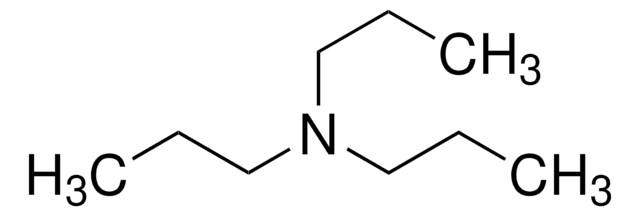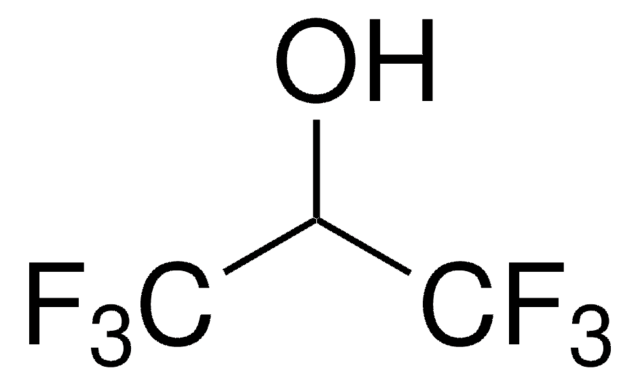90780
Tributylamine
puriss. p.a., ≥99.0% (GC)
Synonym(s):
Tri-n-butylamine
About This Item
2.4 mmHg ( 55 °C)
Recommended Products
vapor density
6.38 (vs air)
Quality Level
vapor pressure
0.3 mmHg ( 20 °C)
2.4 mmHg ( 55 °C)
grade
puriss. p.a.
Assay
≥99.0% (GC)
form
liquid
autoignition temp.
410 °F
expl. lim.
6 %
impurities
≤0.2% water
refractive index
n20/D 1.428 (lit.)
n20/D 1.429
bp
216 °C (lit.)
mp
−70 °C (lit.)
density
0.778 g/mL at 25 °C (lit.)
cation traces
Al: ≤0.5 mg/kg
Ba: ≤0.1 mg/kg
Bi: ≤0.1 mg/kg
Ca: ≤0.5 mg/kg
Cd: ≤0.05 mg/kg
Co: ≤0.02 mg/kg
Cr: ≤0.02 mg/kg
Cu: ≤0.02 mg/kg
Fe: ≤0.1 mg/kg
K: ≤0.5 mg/kg
Li: ≤0.1 mg/kg
Mg: ≤0.1 mg/kg
Mn: ≤0.02 mg/kg
Mo: ≤0.1 mg/kg
Na: ≤0.5 mg/kg
Ni: ≤0.02 mg/kg
Pb: ≤0.1 mg/kg
Sr: ≤0.1 mg/kg
Zn: ≤0.1 mg/kg
functional group
amine
SMILES string
CCCCN(CCCC)CCCC
InChI
1S/C12H27N/c1-4-7-10-13(11-8-5-2)12-9-6-3/h4-12H2,1-3H3
InChI key
IMFACGCPASFAPR-UHFFFAOYSA-N
Looking for similar products? Visit Product Comparison Guide
Related Categories
General description
Application
It may be used in the preparation of PdCl,N and PdOAc,N (palladium nanoparticles). It may be used as an additive during the synthesis of 3-bromothieno[3,2-c]pyridine-4-(5H)-one.
Signal Word
Danger
Hazard Statements
Precautionary Statements
Hazard Classifications
Acute Tox. 1 Inhalation - Acute Tox. 2 Dermal - Acute Tox. 4 Oral - Skin Irrit. 2
Storage Class Code
6.1A - Combustible acute toxic Cat. 1 and 2 / very toxic hazardous materials
WGK
WGK 1
Flash Point(F)
145.4 °F - closed cup
Flash Point(C)
63 °C - closed cup
Personal Protective Equipment
Choose from one of the most recent versions:
Already Own This Product?
Find documentation for the products that you have recently purchased in the Document Library.
Our team of scientists has experience in all areas of research including Life Science, Material Science, Chemical Synthesis, Chromatography, Analytical and many others.
Contact Technical Service







